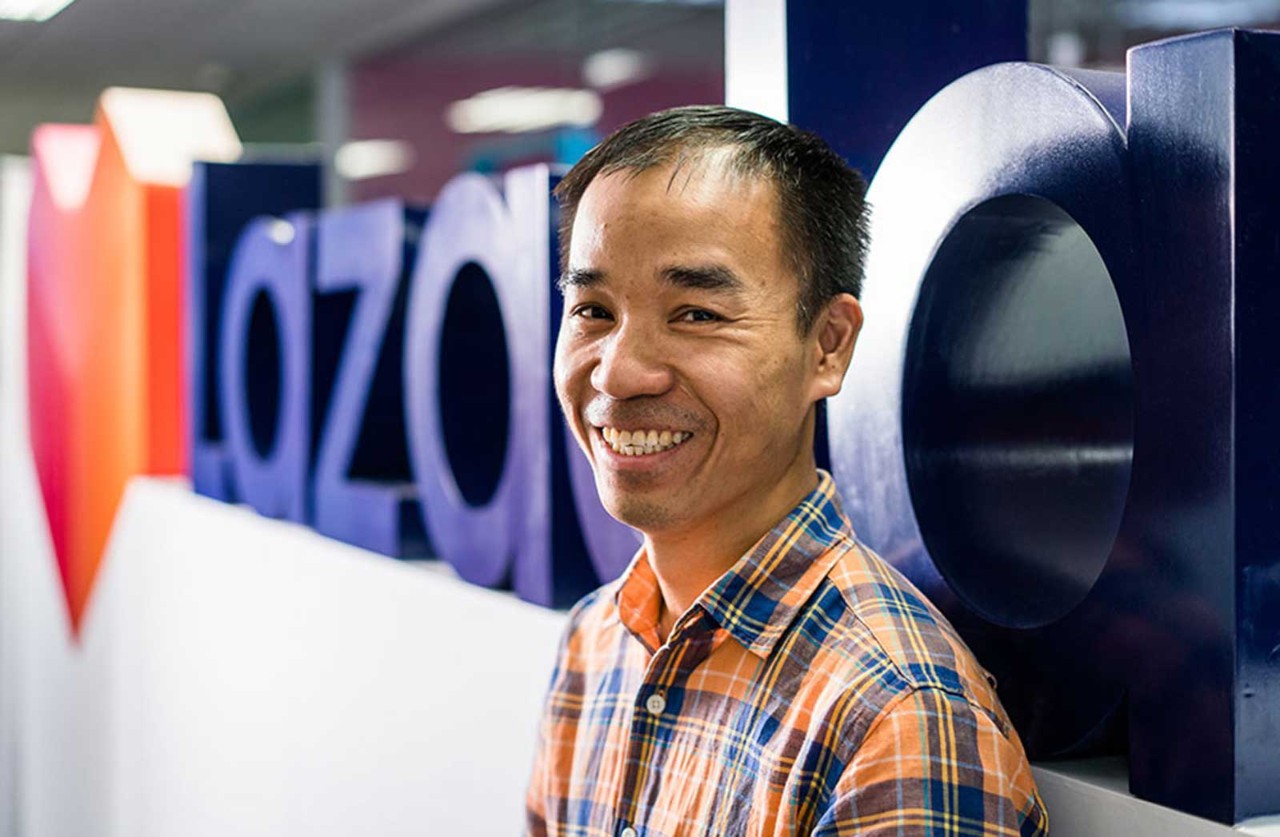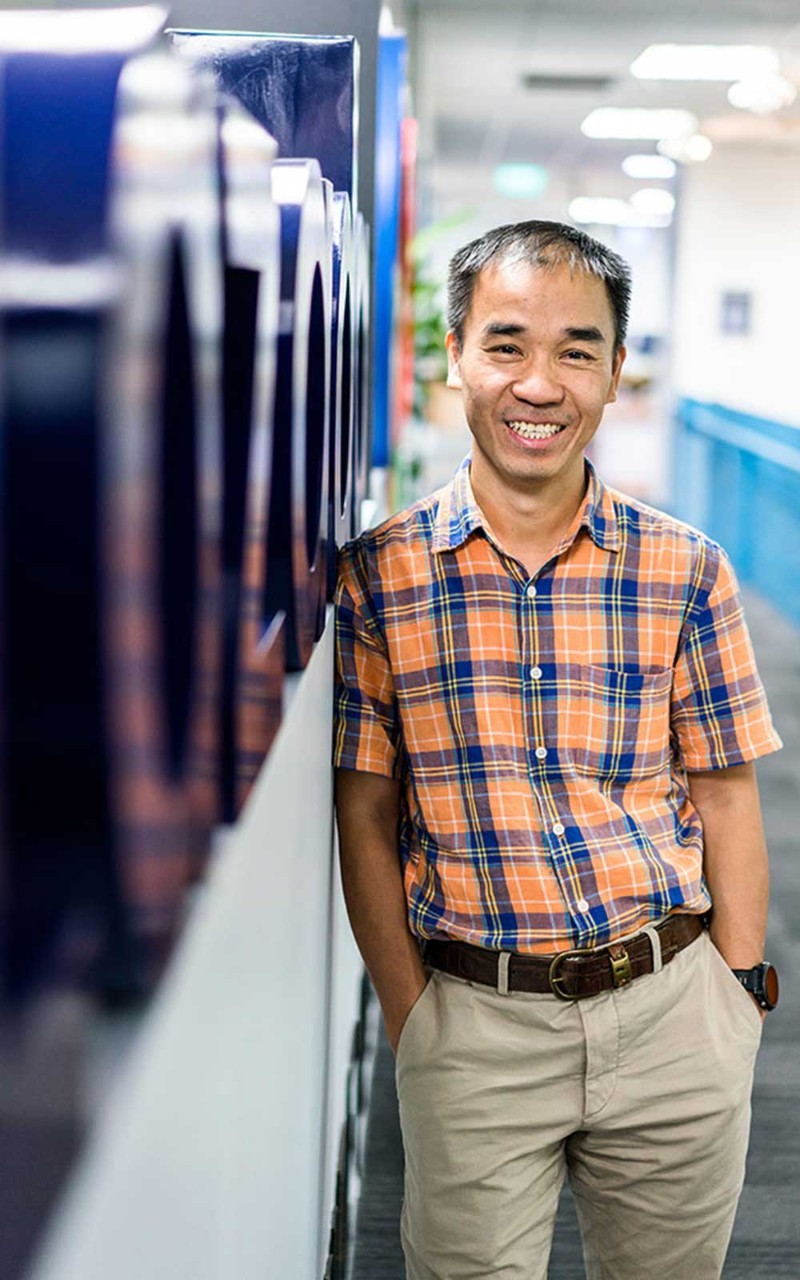
If someone was searching for the perfect example of what kind of personal and professional growth is possible in a fast-growing economy like Vietnam’s, Dung Dang-Anh would fit the bill.
He grew up poor in a small fishing village near Da Nang, on the country’s central coast, and is now the CFO of Lazada Vietnam, a major player in the booming e-commerce sector. This path, however, wasn’t exactly planned.
‘My dream was to become a writer or a reporter but, given my background, after finishing high school I thought I needed to do something with a good salary, and economics sounded like a good option,’ Dung says.
He spent a year at a university in Hue, Vietnam’s old royal capital, before receiving a scholarship to study economics and finance in Sydney, Australia.
‘I was happy that I finished the courses, and thought I’d never look at accounting again,’ he admits. ‘But when I returned to Vietnam in 2001, I applied for a job at Unilever, and they offered me an assistant accounting manager position, which I accepted.’
Looking for more
It didn’t take long for him to want more, though. ‘After about a year, I started to feel like I was missing something, as accounting is just one part of the picture. You understand profits and losses well, but you don’t understand risk management, control or how to balance finances.’
At that time, Unilever was offering employees sponsorship to undertake the ACCA Qualification. Dung took advantage of this opportunity and began studying in 2003. A heavy workload forced him to pause his training, but after picking it up again in 2007 he graduated in 2009.
I think every business should have a purpose; it shouldn’t just focus on making money, otherwise it won’t last long
Lazada
Founded in 2012, e-commerce platform Lazada operates in Vietnam, Indonesia, Malaysia, the Philippines, Singapore and Thailand, connecting the region through technology, logistics and payments capabilities. By 2030, the group aims to serve 300 million customers. In 2016, Lazada became the regional flagship of the Alibaba Group. Products include LazMall, South-East Asia’s biggest virtual mall connecting shoppers to more than 18,000 leading international and local brands; Lazada Marketplace, which provides a full suite of services, from secure payment options and customer care support; and a crossborder platform that offers a gateway for South-East Asian brands to reach international consumers.
In 2014 he transferred to Unilever’s regional office in Singapore. ‘I travelled around and did audits in Africa and Asia, so I got to see what was going wrong with different businesses. People didn’t like me very much, but it was a lot of fun,’ he jokes.
New challenge
Eighteen months ago, he decided to join Lazada Vietnam, the national arm of Lazada Group, an e-commerce platform headquartered in Singapore and owned by Alibaba.
‘Unilever was a great place, but after 18 years I felt a bit sluggish,’ he admits. ‘You can feel your learning curve starting to plateau. I didn’t feel very energised or challenged, and worried that I was falling behind, especially with young, bright talent coming up who absorb the pace of change much better than I do.
‘I had to make that move, otherwise I’d become irrelevant in the longer term.’
Dung was also attracted to Lazada’s position in the dynamic e-commerce industry, where every day brings new challenges and opportunities to adapt and learn. This would give him an opportunity to make his mark.
‘At Unilever, I controlled a budget of a few hundred million dollars a year, which was a huge job, but I wasn’t responsible for the whole team,’ he says. ‘As a person, you have your own ideas on what needs to be done, ideas you want to introduce, a personal imprint you want to have. But as a deputy, you don’t have that kind of opportunity.’
E-commerce expansion
There is no denying that Dung entered the e-commerce world at an exciting, challenging time, a reality that has accelerated due to the Covid-19 pandemic. According to Vietnam’s Ministry of Industry and Trade, the country’s e-commerce sector is expected to grow by 20% in the fourth quarter of this year compared with the same period in 2019, increasing the value of the sector to US$12bn.
Over the past five years, e-commerce in Vietnam has grown by roughly 30% annually, thanks to widespread adoption of smartphones, cheap and universally available mobile data, and increased trust in platforms like Lazada.
The sector’s market size is currently forecast to reach US$35bn by 2025, which would make it the third largest in South-East Asia.
I think the nature of this sector is very dynamic, and there are a lot of examples of things changing overnight

CV
2019
CFO, Lazada Vietnam
2018
Finance director, go-to-market, Unilever Vietnam
2017
Finance director, finance excellence team, Unilever Vietnam
2014
Category finance manager, Unilever Asia
2011
Corporate audit manager, Unilever Asia
2009
Senior supply chain finance manager, Unilever Vietnam
2008
Finance project manager, Unilever Vietnam
2005
Factory accounting manager, Unilever Vietnam
2001
Management accounting manager, Unilever Vietnam
ACCA advantage
While Lazada provided a very different environment from Unilever, Dung found that his ACCA background proved immensely helpful from day one.
‘I’m a very balanced guy; managing profits and losses is very stressful, but I understand it well, especially from my years in corporate auditing,’ he says. ‘ACCA gives me that perspective, and also the skillset.
‘I think the ACCA Qualification builds a very balanced view. Even back in my day, the syllabus was already progressive, and tried to give students a broader perspective, with modules around management accounting and strategy. Later on, I found those to be helpful in my day-to-day job.’
Pandemic impact
Of course, something Dung could not have predicted when he joined Lazada was the pandemic, which has upended life around the world. Vietnam has handled the crisis remarkably well, keeping economic damage relatively contained, with e-commerce a clear winner.
‘In other countries in South-East Asia, like the Philippines or Indonesia, the pace of change is even faster than in Vietnam,’ Dung says. ‘We have the blessing of having very good control of the situation here, so that slows the dynamic a little bit, but it still gives people a very good incentive to move into online shopping and e-commerce.’
Government officials and agencies are also now realising the economic benefits of e-commerce, particularly when it comes to helping small and medium-sized enterprises, many of which have been severely impacted by the pandemic.
‘Offline traffic for shops is slow, and a lot of places lost their customer base overnight,’ he says. ‘We have all these fundamental changes happening in the wider economy that could take e-commerce to the next level, and I think that will continue a lot more in the coming years.’
Dung believes that even after the pandemic ends, many people will keep their online shopping habits, while improved regulatory environments will also spur further e-commerce expansion.
Challenges ahead
Of course, this is not to say that the road to continued robust growth will be smooth.
‘The challenges are numerous,’ Dung says. ‘Given the short history of e-commerce in Vietnam, we don’t have a deep bench of talent. I’m an example; I had zero knowledge of e-commerce or online sales. So if you want to build a sustainable workforce, you have to spend a lot of time investing in talent and people, and that is expensive.’
He also hopes to see improved regulations as well as the introduction of more payment solutions in a country where reliance on cash remains strong.
Logistics present another challenge, as Vietnam’s geography and relatively poor road and railway networks hamper quick delivery outside of major urban areas.
Dynamic sector
Despite all of this, Dung is excited about the future, both in terms of his own career and the broader industry.
‘I think the nature of this sector is very dynamic, and there are a lot of examples of things changing overnight,’ he says. ‘Two years ago, Uber was a big name here, and now they’re gone. But e-commerce is here to stay. And because of its growing impact, both Lazada and the sector as a whole need to think about their role in the bigger environment. It’s going to be disruptive and impact our lifestyles and logistics, with a major move from offline to online retail.’
He concludes with what could be considered a personal philosophy. ‘I think every business should have a purpose; it shouldn’t just focus on making money, otherwise it won’t last long,’ he says. ‘We have to think of our broader role and how we can help facilitate the economy and job creation.’





